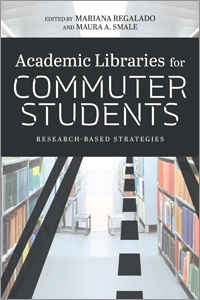Primary tabs
You don't need to be an ALA Member to purchase from the ALA Store, but you'll be asked to create an online account/profile during checkout to proceed. This Web Account is for both Members and non-Members. Note that your ALA Member discount will be applied at the final step of the checkout process.
If you are Tax-Exempt, please verify that your account is currently set up as exempt before placing your order, as our new fulfillment center will need current documentation. Learn how to verify here.
- Description
- Table of Contents
- About the authors
- Reviews
Description
Did you know that more than 85% of U.S. undergraduates commute to college? Yet the literature geared to academic libraries overwhelmingly presumes a classic, residential campus. This book redresses that imbalance by providing a research-based look at the specific academic needs of commuter students. Edited by a team of librarians and anthropologists with City University of New York, the largest urban public university in the U.S, it draws on their ongoing research examining how these students actually interact with and use the library. The insights they’ve gained about how library resources and services are central to commuter students’ academic work offer valuable lessons for other institutions. Presenting several additional case studies from a range of institution types and sizes, in both urban and suburban settings, this book provides rigorous analysis alongside descriptions of subsequent changes in services, resources, and facilities. Topics include
- why IUPUI interior designers decided to scrap plans to remove public workstations to make way for collaborative space;
- how ongoing studies by University of North Carolina anthropologist Donna Lanclos shaped the design of the Family Friendly Library Room, where students may bring their children;
- ways that free scanners and tablet lending at Brooklyn College supports subway studiers;
- ideas from students on how best to help them through the use of textbook collections;
- using ACRL’s Assessment in Action model to learn about student engagement and outcomes with library instruction at a community college; and
- guidance on enlisting the help of anthropology students to conduct interviews and observations in an ethnographic study.
With its emphasis on qualitative research, this book will help readers learn what commuter students really need from academic libraries.
Table of Contents
Acknowledgments
Chapter 1 Situating Commuter Undergraduates
Maura A. Smale and Mariana Regalado
Chapter 2 Commuter Campus in Transition: Meeting the Changing Needs of Students through Mixed-Methods Assessment
M. Sara Lowe, Willie Miller, and Paul Moffett
Chapter 3 Making Space in the Library for Student-Parents
Donna M. Lanclos and Rachael Winterling
Chapter 4 Beyond the Bubble: Undergraduate Commutes and the Library at a Flagship Public University
Juliann Couture
Chapter 5 A Decade of Research at Urban Commuter Colleges
Jean Amaral, Mariana Regalado, and Maura A. Smale
Chapter 6 “I Study in My Car:” Exploring the Study Habits of California Community College Commuter Students
Brian Greene and Elizabeth Horan
Chapter 7 Making the Library Work for Community College Commuters: The Case of Montgomery College
Tanner Wray and Nancy Fried Foster
Chapter 8 Library Instruction and Academic Success: The Impact of Student Engagement
Ted Chodock
Chapter 9 Lessons Learned from Our Commuter Students
Mariana Regalado and Maura A. Smale
Contributors
Index
About the authors
Mariana Regalado
Mariana Regalado is Associate Professor and Head of Reference & Instruction, Library at Brooklyn College, City University of New York. With Maura Smale, she is the author of Digital Technology as Affordance and Barrier in Higher Education. She has researched and published on undergraduate research habits.
Maura A. Smale
Maura A. Smale is Professor and Chief Librarian at New York City College of Technology, City University of New York. With Mariana Regalado, she is the author of Digital Technology as Affordance and Barrier in Higher Education. She has researched and published on student scholarly habits, critical librarianship, and open education.
Reviews
”While the institutional contexts may differ, common themes emerge, such as the importance of the library as a place for students who don't have a dorm room to return to during the day. Similarly, the findings of the studies underscore the importance of collaboration, both inside and outside of the library, to better understand the experiences of commuter students from all walks of life and to develop initiatives that contribute to their success in college."
— Booklist
”The overarching goal is to help librarians design and develop services, resources, and facilities for the students they serve ... When one takes into account the fact that the percentage of commuter students in the college population, the need for this book becomes obvious. Recommended."
— ARBA
”An excellent book for researchers and academic librarians who want to learn how other libraries and institutions are researching and responding to the needs of commuter students. Though only focusing mainly on undergraduate commuter students in the U.S., this book is important to readers interested in the applications of ethnographic research in libraries and for those seeking ideas on how to develop their own research to understand this group of students, regardless of geographic location."
— International Journal of Information, Diversity, & Inclusion (IJIDI)
"Regalado and Smale’s experiences in libraries and higher education bring both practical experience and knowledge to the work ... Each chapter is composed of well-written and informative case studies that make it an appropriate addition to any college library. Chapters are concise and varied and therefore could easily be read separately. This makes them easy to include on syllabi for any number of information science courses, serving as interesting prompts for student discussion."
— Serials Review



